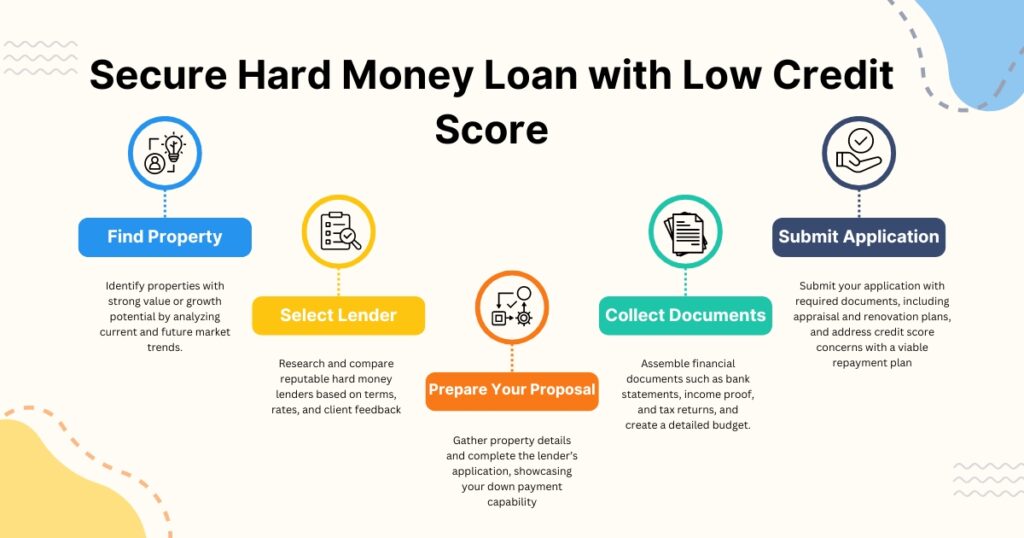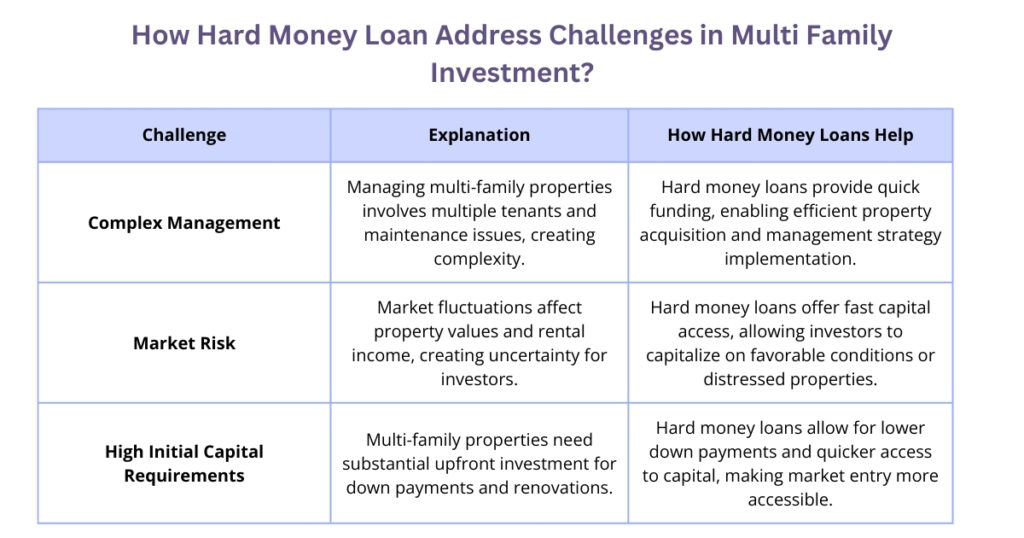What Hard Money Lenders Look for in Borrowers?


Hard money loans are asset-based loans secured by real estate, making them ideal for borrowers needing quick financing. Unlike traditional loans, hard money loans prioritize the property’s value over the borrower’s credit history. Key requirements include substantial property equity, a down payment of 20-40%, a strong exit plan, and financial stability. Lenders also consider the property’s current condition and market trends. To improve approval chances, borrowers should have liquid reserves, a credit score of 550+, and a proven investment history. Interest rates for 2024 range from 9.5-12%. By meeting these criteria, borrowers can secure favorable loan terms. For expert guidance, contact Munshi Biz.
How to Refinance a Hard Money Loan: A Step-by-Step Guide


Hard money loans have become a popular short-term financing option for real estate investors, with 30% of these loans being refinanced within two years. Refinancing offers numerous benefits, including improved loan terms, debt consolidation, lower interest rates, and extended repayment periods. It’s ideal for investors looking to complete rehab projects, purchase additional properties, or avoid high-interest balloon payments. To refinance, borrowers must meet eligibility criteria such as a minimum credit score of 620, a sufficient loan-to-value ratio, and income verification. The process involves evaluating your financial situation, gathering documents, comparing lenders, and choosing the best loan offer. Refinancing a hard money loan strategically helps investors secure long-term funding and optimize cash flow for future investments.
2024 Jumbo Loan Down Payment Requirements: Tips for Homebuyers


Jumbo loans are mortgages for high-value homes that exceed the Federal Housing Finance Agency’s (FHFA) conforming loan limits, set at $766,550 in 2024. While traditionally requiring a 20% down payment, some lenders now offer jumbo loans with as low as 5% down. Key factors influencing down payments include loan size, credit score, income, and lender policies. Borrowers can improve terms by enhancing credit scores, saving diligently, exploring various lenders, and considering down payment assistance programs. Though jumbo loans do not require private mortgage insurance (PMI), they involve stricter qualifications and higher closing costs. Refinancing is also an option for borrowers seeking better terms. To navigate jumbo loans effectively, consult an experienced mortgage lender for tailored advice.
Conventional Loan vs Jumbo Loan: Which Mortgage Option Suits You Best?


When buying a home, understanding the differences between conventional and jumbo loans is crucial. Conventional loans are government-backed, ideal for first-time buyers with conforming loan limits and flexible down payment options. Jumbo loans, on the other hand, cater to high-priced properties that exceed conforming loan limits, typically requiring stricter qualifications, higher down payments, and slightly higher interest rates. While conventional loans offer more flexibility, jumbo loans are necessary for luxury homes in expensive markets. Assess your financial situation, down payment capacity, and long-term goals to choose the best option. Consult a mortgage expert to guide you through the process efficiently.
Jumbo vs Super Jumbo Mortgages: A Comprehensive Guide for Homebuyers


Jumbo and super jumbo loans offer financing options for buyers seeking luxury homes in high-priced markets like New York and Los Angeles. A jumbo loan exceeds the conforming loan limit of $726,200, while a super jumbo loan typically starts at $3 million. Both require strong financial qualifications, such as excellent credit, substantial down payments, and proof of income. While jumbo loans are more widely available, super jumbo loans cater to ultra-high-net-worth buyers. Despite higher interest rates and a complex application process, these loans allow affluent buyers to purchase premium properties. Choosing between the two depends on the home’s price and your financial situation. For expert advice and to find the right lender, contact munshi.biz today.
How To Secure A Hard Money Loan With A Low Credit Score?


Hard money loans are a flexible and quick financing solution for multi-family real estate investments, offering an alternative to traditional loans. These asset-based loans prioritize property value over the borrower’s credit score, making them ideal for investors with less-than-perfect credit or those needing fast capital. Their short-term nature provides bridge financing, allowing investors to secure a property quickly and refinance later. Key benefits include a faster approval process, higher risk tolerance, and quick funding, though they come with higher interest rates, typically 8%-15%, and a lower loan-to-value (LTV) ratio. To secure a hard money loan for a multi-family property, borrowers should prepare necessary documentation, compare lenders, and negotiate terms. It’s important to assess property values accurately, plan for potential risks, and have a solid exit strategy to convert the loan into long-term financing or sell the property. Working with commercial lenders specializing in multi-family investments can maximize returns by leveraging quick funding and tailored financing solutions.
The Significance Of All-Cash Offers In The Home Selling Process


All-cash offers have become a preferred option in the home selling process due to their speed, simplicity, and certainty. Unlike traditional mortgage-backed purchases, cash transactions eliminate the need for financing contingencies, appraisals, and lengthy closing processes. Sellers benefit from fewer repair demands, reduced contingencies, and lower closing costs, allowing them to sell their property as-is and on their own timeline. With cash transactions accounting for 38% of home sales in 2023, this method is increasingly common, especially in competitive markets. All-cash offers provide a smoother, faster, and more convenient home selling experience for both buyers and sellers.
Traditional Sale vs. All-Cash Offer: What’s Right for You?


When selling your home, choosing between a traditional sale and an all-cash offer can significantly impact the process. A traditional sale involves listing the property, finding buyers, and waiting for financing approvals, making it slower but potentially allowing for higher offers. In contrast, an all-cash offer ensures a faster, hassle-free transaction with fewer contingencies and guaranteed closing, appealing to sellers seeking speed and certainty. Cash sales often bypass inspections, appraisals, and financing hurdles, providing a convenient and straightforward process. Understanding these differences is crucial in deciding which method best suits your needs. Contact us for expert advice to help you choose the most beneficial option.
Multi-Family Investment Landscape With Hard Money Loans


Hard money loans are a flexible and quick financing solution for multi-family real estate investments, offering an alternative to traditional loans. These asset-based loans prioritize property value over the borrower’s credit score, making them ideal for investors with less-than-perfect credit or those needing fast capital. Their short-term nature provides bridge financing, allowing investors to secure a property quickly and refinance later. Key benefits include a faster approval process, higher risk tolerance, and quick funding, though they come with higher interest rates, typically 8%-15%, and a lower loan-to-value (LTV) ratio. To secure a hard money loan for a multi-family property, borrowers should prepare necessary documentation, compare lenders, and negotiate terms. It’s important to assess property values accurately, plan for potential risks, and have a solid exit strategy to convert the loan into long-term financing or sell the property. Working with commercial lenders specializing in multi-family investments can maximize returns by leveraging quick funding and tailored financing solutions.
How To Sell A House In California?


Selling a home in California can be complex, but with the right guidance, it becomes a manageable and profitable experience. From deciding the optimal time to sell and pricing your home competitively to staging, negotiating offers, and handling inspections, each step is crucial for a successful sale. Working with an experienced real estate agent like Amish Munshi, who offers expert advice on market trends, comparative market analysis (CMA), and cost-saving strategies, can streamline the process. Additionally, understanding California-specific requirements, handling necessary documentation, and closing the deal with precision ensures a smooth transaction. Contact us to simplify your home selling journey and maximize your profits in the competitive California market.
